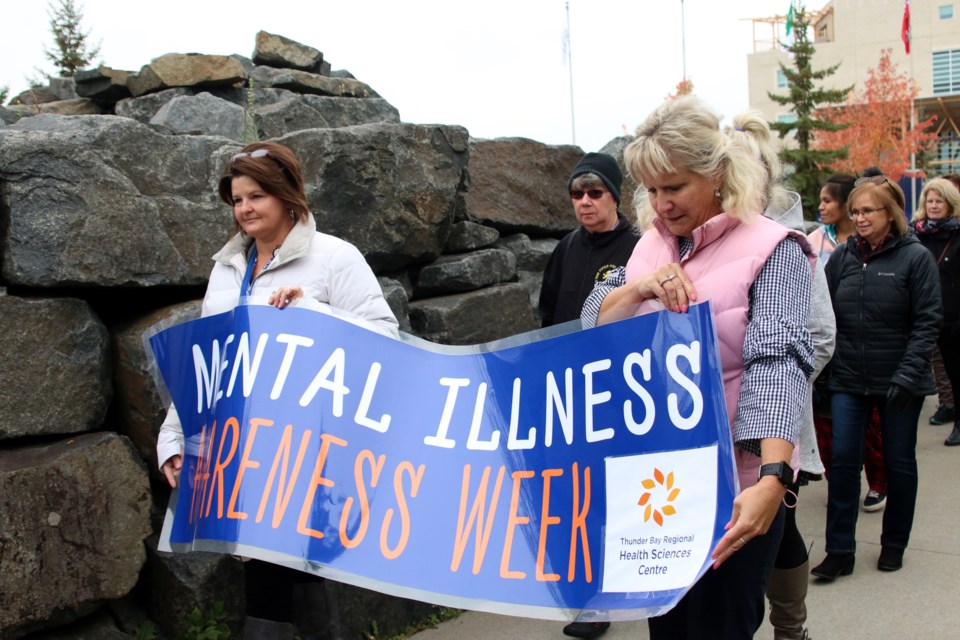THUNDER BAY - In 2005, Margaret Hajdinjak lost her son to suicide. Shortly before his death, he went to the Thunder Bay Regional Health Sciences Centre but Hajdinjak said he did not receive the care he needed.
Now serving as a patient/family advisor at the TBRHSC, Hajdinkjak believes staff and administration continue to work on developing new ways to treat people with mental health issues, including screening all patients admitted to the hospital.
“I think it is really important to have that done,” Hajdinjak said. “If you don’t talk to people and you don’t feel like they can open up, then you’re not going to understand what they are dealing with or where they are coming from.”
These new policies and strategies to deal with mental health issues in the community are part of the hospital’s strategic plan for 2020 and were highlighted during the Mental Illness Awareness Walk that was held at the TBRHCS on Monday.
“It’s really to help the community feel more comfortable talking about mental illness, particularly our patients who come into our hospital,” said Dr. Peter Voros, executive vice president of in-patient care programs at the TBRHCS.
The hospital first began to kickoff Mental Illness Awareness Week with the walk around the facility grounds three years ago and in that time, Voros said there has been a change in how mental illness is treated.
“We are in the fourth year of the plan and we are doing a lot of work to try to help people feel more comfortable to talk about what is going on with their mental health,” he said.
“Every patient who is admitted to hospital is now screened for mental illness. Nurses invite the conversation rather than waiting for the patient to bring it up. They recognize that many people suffer from mental health issues so people who come into the hospital with physical issues are no different than anyone else and many of them are struggling with mental health.”
Just as nurses ask patients a series of questions relating to physical health, patients are now also asked questions relating to their mood or anxiety.
“If anything alerts the nurse, it opens up the door for further conversation,” Voros said. “It is making sure we don’t avoid the conversation and just making sure we have that conversation with every patient. It’s about making sure that nobody falls through the gaps.”
Patients may then be referred to further treatment depending on recommendations from the doctors. Nurses trained in mental health and psychiatrists are also available if required.
Other changes are also being looked at, according to Hajdinjak, including how patients are triaged in the emergency department.
“Some of the changes they are looking at and have implement is having people interviewed in private rooms and having triage done and assessment done immediately for people who are dealing with those issues,” she said. “It’s a lot of privacy and respect for that individual.”
Rates of mental health issues in Northern Ontario are more than double the provincial average. Both Voros and Hajdinjak said addictions issues and mental health issues are often related and in order to help those in need, doctors, nurses, and patients cannot shy away from starting the conversation.
“We know when people are asked directly, most people will tell you what’s going on,” Voros said. “The problem is we don’t ask. We shy away from asking those questions and I think as a community we need to start asking people how they are doing and how they are feeling.”
“I think the stigma is being let down around mental health and more people are coming forward,” Hajdinjak added. “Mental health and addictions also go hand-in-hand and I think there are a lot of addictions in our community. I think the hospital is being empowered to help people in the community and really working hard to do that.”
